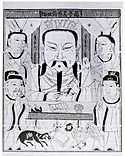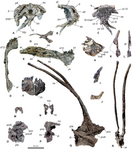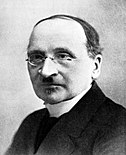Wikipedia:Today's featured article/August 2021
| << | Today's featured articles for August 2021 | >> | ||||
|---|---|---|---|---|---|---|
| Su | Mo | Tu | We | Th | Fr | Sa |
| 1 | 2 | 3 | 4 | 5 | 6 | 7 |
| 8 | 9 | 10 | 11 | 12 | 13 | 14 |
| 15 | 16 | 17 | 18 | 19 | 20 | 21 |
| 22 | 23 | 24 | 25 | 26 | 27 | 28 |
| 29 | 30 | 31 | ||||
August 1
The Partisan Congress riots were attacks on Jews in Bratislava and other towns in the Slovak part of Czechoslovakia between 1 and 6 August 1946. After World War II, former Slovak partisans were often appointed as administrators of property and businesses that had been confiscated from Jews by the previous regime. In May 1946 a law mandating the restitution of these was passed and antisemitic leaflets and attacks on Jews increased. A national congress of former partisans was held in Bratislava on 2–4 August 1946. Rioting began on 1 August and occurred over six days (scene of one attack pictured). Despite police attempts to maintain order, ten apartments were broken into, nineteen people were injured (four seriously), and the Jewish community kitchen was ransacked. Attacks and riots occurred in other Slovak towns. The contemporary press played down the involvement of partisans. In response, the government launched a crackdown on antisemitic incitement and suspended restitution to Jews. (Full article...)
August 2
The Sirens and Ulysses is a very large oil painting by the English artist William Etty, first exhibited in 1837. It depicts the scene from Homer's Odyssey in which Ulysses (Odysseus) resists the bewitching song of the sirens by having his ship's crew tie him up, while they are ordered to block their own ears to prevent themselves from hearing the song. Traditionally sirens had been depicted as human–animal chimeras, but Etty portrayed them as naked young women on an island strewn with decaying corpses. The painting divided opinion, with some critics greatly admiring it while others derided it as tasteless and unpleasant. Following the 1857 Art Treasures Exhibition, it was removed from display for about 150 years. In 2010 the painting went on permanent display in the Manchester Art Gallery. (Full article...)
August 3
The Moorgate tube crash occurred on 28 February 1975 on the London Underground's Northern City Line; 43 people died and 74 were injured after a train failed to stop at the line's southern terminus, Moorgate station, and crashed into its end wall. It is the worst peacetime accident on the London Underground. The crash forced the first carriage into the roof of the tunnel; the second carriage collapsed at the front as it collided with the first, and the third rode over the rear of the second. The brakes were not applied and the dead man's handle was still depressed when the train crashed. The inquiry by the Department of the Environment found no fault with the train and concluded that the accident was caused by Leslie Newson, the 56-year-old driver. The post-mortem on Newson showed no medical reason to explain the crash, and a cause has never been established. After the crash, London Underground introduced a new safety system that automatically stops a train that is travelling too fast. (Full article...)
August 4

Cai Lun (b. c. 50 – c. 62 CE; d. 121) was a Chinese eunuch court official traditionally regarded as the inventor of paper and the modern papermaking process. Born in modern-day Leiyang, Cai served as chamberlain for Emperor Ming, and as imperial messenger for Emperor Zhang. To assist Lady Dou in securing her adopted son as designated heir, he interrogated Consort Song, who then killed herself. After Emperor He's ascension in 88 CE, Dou rewarded Cai with high office, where he remained despite He's purge of the Dou family in 92 CE. In 105 CE, Cai greatly improved the papermaking process with tree bark, hemp waste, old rags, and fishnets. After Lady Deng, the empress dowager, died in 121 CE, Cai was ordered to the Ministry of Justice because of his involvement in Song's death. Expecting execution, he killed himself instead. Cai's papermaking efforts are considered enormously impactful on human history. He is deified as the god of papermaking, and appears in Chinese folklore. (Full article...)
August 5
The York County, Maine, Tercentenary half dollar is a fifty-cent piece minted in 1936 as a commemorative coin to commemorate the 300th anniversary of the founding of York County, the southernmost county in Maine and the first to be organized. The obverse shows Brown's Garrison, a fort around which York County developed, while the reverse depicts the county's arms. A commemorative coin craze in 1936 saw some coins authorized by the United States Congress that were of mainly local significance; the York County issue was one of these, passing Congress without opposition in the first half of 1936. Maine artist Walter H. Rich designed the issue; his work has garnered mixed praise and dislike from numismatic authors. The Philadelphia Mint struck 25,000 for public sale. Less than 19,000 sold by 1937, more than half to Mainers; the rest were sold in the 1950s. As of 2021, the York County half dollar catalogs for around $200, depending on condition. (Full article...)
August 6
South Park: The Stick of Truth is a 2014 role-playing video game developed by Obsidian Entertainment in collaboration with South Park Digital Studios, and published by Ubisoft for Microsoft Windows, PlayStation 3, and Xbox 360. Based on the American adult animated television series South Park, the game features whimsical fantasy role-playing. As the New Kid, the player can freely explore the town of South Park with a supporting party of characters, fighting aliens, Nazi zombies, and gnomes. The visuals replicate the aesthetic of the television series. South Park creators Trey Parker and Matt Stone (both pictured) wrote the game's script, consulted on the design and voiced many of the characters, as in the television program. Reviewers praised the comedic script and authentic visual style, but some faulted the game over technical issues and a lack of challenging combat. A sequel, South Park: The Fractured but Whole, was released in 2017. (Full article...)
August 7
Henry IV (11 November 1050 – 7 August 1106) was Holy Roman Emperor from 1084 to 1105. After his father's death in 1056, Henry was placed under his mother's guardianship. Archbishop Anno II of Cologne kidnapped him in 1062 and administered Germany until he came of age in 1065. Ignoring the ideas of the Gregorian Reform, Henry insisted on the royal prerogative to appoint bishops in his German and Italian realms. The Investiture Controversy culminated when Pope Gregory VII excommunicated Henry in response to Henry's attempt to dethrone him. Henry carried out his penitential Walk to Canossa in 1077 and Gregory absolved him. Henry's German opponents ignored this absolution and elected an anti-king. Most German and northern Italian bishops remained loyal to Henry and elected the antipope, Clement III, who crowned Henry emperor in Rome in 1084. His son, Henry V, forced him to abdicate on 31 December 1105. (Full article...)
August 8
Shoom was a weekly all-nighter dance music event held at nightclubs in London, England, between December 1987 and early 1990. It is widely credited with initiating the acid house movement in the UK. Shoom was founded by Danny Rampling and managed by his wife Jenni. It began at a 300-capacity basement gym on Southwark Street in South London. By May 1988 its growing popularity necessitated a move to the larger Raw venue on Tottenham Court Road, Central London, and a switch from Saturday to Thursday nights. Later relocations were to The Park nightclub in Kensington and Busby's venue on Charing Cross Road. The early nights featured Chicago house and Detroit techno, mixed with contemporary pop and post-punk. Its musical and visual culture evolved around the classical hallucinogenic drug LSD and the psychoactive drug MDMA, the latter commonly known in the UK as ecstasy or "E". Shoom closed shortly after open drug use at the club began to attract police attention. By this time, electronic music had crossed into the mainstream as the heavier sounding rave style became popular. (Full article...)
August 9
The 2008 UAW-Dodge 400 was the third stock car race of the 2008 NASCAR Sprint Cup Series. It was held on March 2 before a crowd of 153,000 in Las Vegas, Nevada, at Las Vegas Motor Speedway. The 267-lap race was won by Carl Edwards of the Roush Fenway Racing team, for his ninth career win in the series. Dale Earnhardt Jr. finished second and Edwards's teammate Greg Biffle came in third. The race was stopped when Jeff Gordon crashed on lap 262, strewing car parts into the path of other drivers; after the restart, Edwards maintained the lead. There were eleven cautions and 19 lead changes by nine different drivers during the race. Ford took over the lead of the Manufacturers' Championship, five points ahead of Dodge. The race attracted 12.1 million television viewers. Edwards was later issued with a 100-point penalty after his car was found to violate NASCAR regulations, dropping him from first to seventh in the Drivers' Championship. (Full article...)
August 10
Hurricane Olivia was a Category 4 hurricane that hit Hawaii as a weakening tropical storm in September 2018, causing severe flooding and wind damage. Olivia was the first tropical cyclone to make landfall on either Maui or Lanai since modern weather records began. It was the fifteenth named storm, ninth hurricane, and sixth major hurricane of the 2018 Pacific hurricane season. A tropical depression formed southwest of Mexico on September 1 and strengthened into a tropical storm a day later. Olivia peaked as a Category 4 hurricane on September 7, with winds of 130 mph (210 km/h) and a minimum pressure of 951 mbar (28.08 inHg). On September 12 the storm weakened and made brief landfalls on Maui and Lanai, with winds of 45 mph (70 km/h). Torrential rainfall occurred on both Maui and Oahu, peaking at 12.93 in (328 mm) in West Wailuaiki, Maui. Olivia felled trees on Maui, and some homes and vehicles were swept away by floodwaters. (This article is part of a featured topic: 2018 Pacific hurricane season.)
August 11
Arthur Sullivan (1896–1937) was an Australian recipient of the Victoria Cross. Born in South Australia, Sullivan enlisted in the Australian Imperial Force during World War I. Sent to the United Kingdom, he completed training after the Armistice came into effect. Wanting to see active service, he sought his discharge and enlisted in the British Army with the North Russia Relief Force, part of the Allied intervention in the Russian Civil War. In the early morning of 11 August 1919 he was a member of a rearguard withdrawing across the Sheika River in North Russia. As his platoon crossed the river on a one-plank bridge, it came under intense fire from Bolshevik troops, and four men fell into the river. Sullivan jumped in and rescued all four, one by one; he was awarded the Victoria Cross for his actions. He was part of the Australian Coronation Contingent in London for the coronation of King George VI in 1937 when he died of head injuries received in a fall. (Full article...)
August 12
Star Trek Generations is a 1994 American science fiction film, the seventh in the Star Trek film series. Malcolm McDowell (pictured) joined cast members from the 1960s television show Star Trek and the 1987 spin-off The Next Generation, including William Shatner and Patrick Stewart. In the film, Captain Jean-Luc Picard of the USS Enterprise-D joins with Captain James T. Kirk to stop the villain Tolian Soran from destroying a planetary system. David Carson directed with photography by franchise newcomer John A. Alonzo. The distributor, Paramount, marketed the film with merchandising tie-ins, including toys, books, games, and the first website to ever promote a major motion picture. The film opened at the top of the United States box office its first week of release and grossed a total of $118 million worldwide. Critical reception was lukewarm, with critics divided on the film's characters and comprehensibility to a casual viewer. (Full article...)
August 13
The Battle of Blenheim was fought on 13 August 1704 during the War of the Spanish Succession. The French were seeking to knock Austria out of the war by seizing its capital, Vienna. An army of the reconstituted Grand Alliance, led by the Duke of Marlborough, marched south from the Dutch Republic to the Danube. There he defeated the Bavarians at the Battle of Donauwörth and joined an Austrian army under Prince Eugene. A French army under Marshal Tallard bolstered the Elector of Bavaria's forces. The opposing armies met on the banks of the Danube near the village of Blindheim. Marlborough unexpectedly attacked the slightly larger Franco-Bavarian army and after a hard day's fighting inflicted a crushing defeat. France suffered around 30,000 casualties, Tallard was taken prisoner and Bavaria was knocked out of the war. Before the campaign ended, the Allies had taken several important towns and were preparing to invade France in 1705. (Full article...)
August 14
The ring ouzel (Turdus torquatus) is a medium-sized thrush, breeding mainly in Europe. Males are mostly black with a white crescent across the breast, females are browner and duller than males, and young birds may lack chest markings. A high-altitude bird, it breeds in open mountain areas with some trees or shrubs, often including heather or juniper. It is migratory, wintering in southern Europe, northern Africa and Turkey, often in mountains with juniper. A typical clutch of three to six brown-flecked pale blue or greenish eggs is incubated by the female and hatches after 13 days. The downy chicks fledge in another 14 days. The thrush is omnivorous, eating invertebrates, particularly insects and earthworms, some small vertebrates, and a wide range of fruit. Most animal prey is caught on the ground. With an extensive range and a large population, the ring ouzel is evaluated as a least-concern species by the IUCN. There are declines in several countries, perhaps due to climate change or human disturbance. (Full article...)
August 15

Shaw and Crompton is a civil parish in the Metropolitan Borough of Oldham, Greater Manchester, England, containing the town of Shaw. Formerly known as Crompton, the parish lies at the edge of the South Pennines, 9 miles (14 km) northeast of Manchester. There is evidence of ancient British and Anglian activity in the area, and by the Middle Ages it was a small township, although lacking a lord's manor. Farming was the main industry with some hand-loom woollen weaving until textile manufacture during the British Industrial Revolution initiated rapid urbanisation. By the late 19th century Crompton had emerged as a densely populated mill town. Imports of foreign cotton led to a decline in textiles in the mid–20th century and the last mill closed in 1989. The borough is mainly suburban, with a population of 21,065 as of 2011. Of the 48 cotton mills, some very large, that have existed in the area, several now serve as home to large distribution companies. (Full article...)
August 16
Dimple Kapadia (born 1957) is an Indian actress of Hindi films. She was discovered at age 14 by Raj Kapoor, who cast her in the title role of Bobby, a major success in 1973. The same year, she married and then quit acting until 1984. Both Bobby and her comeback film Saagar (1985) won her Filmfare Awards for Best Actress. She established herself as a leading lady in both mainstream and parallel Hindi cinema and won acclaim for Kaash (1987), Drishti (1990) and Lekin (1991). Her portrayal of a professional mourner in Rudaali (1993) won her a Filmfare Critics Award and the National Film Award for Best Actress; a supporting role in Krantiveer (1994) earned her a fourth Filmfare Award. Less active in later decades, Kapadia played troubled middle-aged women in Dil Chahta Hai (2001) and Leela (2002). She followed with several leading roles, but character parts in films including Luck by Chance (2009), Finding Fanny (2014) and the Hollywood thriller Tenet (2020) brought her more success. (Full article...)
August 17
William de Cantilupe was killed by multiple stab wounds in Scotton, Lincolnshire, in March 1375. The de Cantilupes were a wealthy English family and had a history of service to the crown. They were major landholders in the Midlands, with estates in Greasley, Ilkeston, and Withcall. William de Cantilupe's ancestors included royal councillors and, distantly, Saint Thomas de Cantilupe. Among the suspects in the murder were his wife Maud and the sheriff Thomas Kydale. Maud may have had an affair with Kydale during her husband's frequent absences on service during the war in France. Fifteen members of the household were also accused. De Cantilupe's murder was the first to come within the purview of the Treason Act 1351, a statute which declared the murder of a man by his wife or servants to be petty treason. Maud was tried and acquitted. She then married Kydale. Two members of the household staff were convicted and executed. Others who were indicted did not appear for trial and were outlawed. One of the outlaws, de Cantilupe's steward, John Tailour of Barneby, was pardoned by Richard II. (Full article...)
August 18

The Gurian Republic was an insurrection and protest movement in the western Georgian region of Guria between 1902 and 1906, against the Russian Empire. It arose from a revolt over land grazing rights; taxation, land ownership and economic factors were also concerns. The Republic established its own system of government, although it was not anti-Russian, desiring to remain within the Empire. The 1905 Russian Revolution led to uprisings throughout the Empire, including Georgia, and in reaction the imperial authorities deployed the military to end the rebellions. The peasants were able to fend off a small force of Cossacks, but overwhelming military force was used to re-assert control in 1906. Some of the Republic's leaders were executed, imprisoned or exiled, but others later played prominent roles in the 1918–1921 Democratic Republic of Georgia. The Gurian Republic demonstrated that peasants could participate in the socialist movement, an idea previously downplayed by leading Marxists. (Full article...)
August 19
Orangutans are great apes native to the rainforests of Borneo and Sumatra. Three species in the genus Pongo are recognised. The most arboreal of the great apes, orangutans spend most of their time in trees. They have proportionally long arms and short legs and their hair is reddish-brown. Adult males may develop distinctive cheek pads or flanges and make long calls that attract females and intimidate rivals. Orangutans are generally solitary, with most social bonds occurring between mothers and their dependent offspring. The apes eat mainly fruit, but also vegetation, bark, honey, insects and bird eggs. Among the most intelligent primates, orangutans use a variety of sophisticated tools and construct elaborate sleeping nests each night from branches and foliage. The illegal pet trade, poaching, and habitat destruction for palm oil cultivation have caused severe declines in the populations and ranges of all three species. (Full article...)
August 20
Shuttle-Centaur was a version of the Centaur upper stage rocket that could be carried aloft inside the Space Shuttle and used to launch satellites into high Earth orbits or probes into deep space. Two variants were produced: Centaur G-Prime, to launch robotic probes to Jupiter; and Centaur G, for use with US Department of Defense Milstar satellites and the Magellan Venus probe. Its power allowed for heavier deep space probes, prolonging the operational life of the spacecraft. The US Air Force agreed to pay half the cost of Centaur G. The Space Shuttles Challenger and Atlantis were modified to carry the Centaur. After the Challenger accident, NASA concluded it was too risky to fly the Centaur on the Shuttle, just months before its first scheduled flight. The Galileo and Ulysses probes were ultimately launched using the less powerful Inertial Upper Stage. A variant of the Centaur G-Prime was mated with the Titan rocket to produce the Titan IV, which placed 16 military satellites in orbit. (Full article...)
August 21
"Candy" is a song by American rapper Foxy Brown (pictured) featuring Kelis, released by Def Jam on August 21, 2001, as the third single from her third studio album Broken Silence (2001). A dance-pop and R&B track, it was produced by the Neptunes duo Chad Hugo and Pharrell Williams, who co-wrote the song alongside Brown and Juan Manuel Cordova. Brown raps on the verses while Kelis, a frequent collaborator with the Neptunes, performs the hook. The lyrics are about cunnilingus. "Candy" received a positive response from critics upon release and in retrospective reviews. Music critics compared it to music by other artists, including Lil' Kim, while scholars analyzed its representation of black female sexuality. In the US, the song appeared on Billboard charts, reaching the top ten on the Hot Rap Songs chart. "Candy" appeared on several soundtracks in the early 2000s; it featured in the television series Dark Angel and the films Friday After Next and The 40-Year-Old Virgin. (Full article...)
August 22

Arsenal Women and Bristol City Women played an association football match on 1 December 2019 that ended with a scoreline of 11–1. It was part of the 2019–20 Football Association Women's Super League (FA WSL) and became the highest-scoring game in the league's history. At the time Arsenal were the reigning champions and third in the league; Bristol City were in tenth position. Dutch international striker Vivianne Miedema scored six of the eleven Arsenal goals, a league record, surpassing South Korean Ji So-yun to become the highest-scoring non-British player in FA WSL history. Miedema was also involved in four of the other five Arsenal goals, which were scored by Lisa Evans (twice), Leah Williamson, Jordan Nobbs, and Emma Mitchell. Yana Daniëls scored the only goal for Bristol City. The result put Arsenal top of the league and left Bristol City in eleventh place out of twelve clubs. The return match was never played, as the season was suspended because of the COVID-19 pandemic. (Full article...)
August 23
Edvard August Vainio (1853–1929) was a Finnish lichenologist. His early works on the lichens of Lapland, his three-volume monograph on the lichen genus Cladonia, and, in particular, his study of the classification and form and structure of lichens in Brazil made Vainio renowned internationally. Vainio's earliest works dealt with phytogeography—elucidating and enumerating flora and its distribution—in the Finnish language. In these publications he demonstrated an attention to detail and thoroughness that became characteristic of his later work. Vainio described about 1700 new taxa, and published more than 100 scientific works. He made significant scientific collections of lichens, and while a herbarium curator at the University of Helsinki and the University of Turku he catalogued and processed other collections from all over the world. He has been called the Father of Brazilian Lichenology and the Grand Old Man of Lichenology. (Full article...)
August 24
The Chandler's Ford shooting was an attempted robbery on 13 September 2007 in which two men were shot dead by officers of London's Metropolitan Police while robbing a cash-in-transit van. The Met had been tracking a gang who had stolen an estimated £500,000 from security vans and learned that the gang intended to rob the HSBC bank in Chandler's Ford. Armed officers hid nearby early in the morning, with snipers in overlooking buildings. Shortly after the G4S van's arrival, a masked Mark Nunes demanded at gunpoint that the guard hand over the cash box. A police sniper shot Nunes in the chest. A second gangster, Andrew Markland, picked up Nunes's gun and was shot twice by another sniper. Officers gave first aid but both men died. An IPCC investigation concluded that the snipers had acted properly, though it found flaws in the planning. An inquest reached a verdict of lawful killing, after which the IPCC recommended that an independent firearms commander be appointed to lead future operations. (Full article...)
August 25
Santería is an African diasporic religion that developed among Afro-Cuban communities during the late 19th century. It arose through the syncretism of the Yoruba religion of West Africa, the Roman Catholic form of Christianity, and Spiritism. Santería is an initiatory tradition with no central authority. It is polytheistic and revolves around deities called oricha. Deriving their names and attributes from traditional Yoruba divinities, they are equated with Roman Catholic saints. Each human is believed to have a personal link to a particular oricha. Practitioners venerate the oricha at altars, where offerings include fruit, liquor, flowers and sacrificial animals. A central ritual involves practitioners drumming, singing, and dancing to encourage an oricha to possess one of their members and thus communicate with them. Healing rituals and the preparation of herbal remedies and talismans also play a prominent role. The number of initiates is estimated to be in the high hundreds of thousands. (Full article...)
August 26

The Crécy campaign was an expedition by an English army from the north of Normandy to the County of Boulogne, devastating the French countryside on a wide front, followed by the successful siege of Calais. It began on 12 July 1346 during the Hundred Years' War. Led by King Edward III, the English stormed and sacked Caen, slaughtering the population. They then devastated the country to the suburbs of Rouen before cutting a swath along the Seine's left bank to Poissy, 20 miles (30 km) from Paris. Turning north, the English became trapped in territory which the French had denuded of food. They escaped by fighting their way across the Somme against a French blocking force. Two days later, on ground of their choosing, the English inflicted a heavy defeat on the French at the Battle of Crécy on 26 August, before moving on to besiege Calais. After an eleven-month siege, which severely stretched both countries' financial and military resources, the town fell. (This article is part of a featured topic: Crécy campaign.)
August 27
USS Iowa is a retired battleship, the lead ship of her class and the last lead ship of any class of United States battleships. Iowa served with the Pacific Fleet in 1944, shelling beachheads at Kwajalein and Eniwetok and screening aircraft carriers operating in the Marshall Islands. She also served as the flagship of the Third Fleet, flying Admiral William F. Halsey's flag at the Japanese surrender in Tokyo Bay. During the Korean War, Iowa was involved in raids on the North Korean coast, after which she was decommissioned. She was reactivated in 1984 and operated in both the Atlantic and Pacific Fleets to counter the recently expanded Soviet Navy. In April 1989, an explosion wrecked her No. 2 gun turret, killing 47 sailors. Iowa was decommissioned for the last time in October 1990 after 19 total years of active service. In 2012 she was donated to the nonprofit Pacific Battleship Center and opened as a museum in Los Angeles. (This article is part of a featured topic: Iowa-class battleships.)
August 28
William Lyon Mackenzie (March 12, 1795 – August 28, 1861) was a Scottish-born Canadian-American journalist and politician. He founded newspapers critical of the Family Compact, represented York County in the Legislative Assembly of Upper Canada and aligned with Reformers. Dundee-born, Mackenzie emigrated to York, Upper Canada, (now Toronto) in 1820 and published his first newspaper in 1824. He was elected to the legislative assembly in 1827 and became Toronto's first mayor in 1834. In 1837, he commanded the rebels in the Upper Canada Rebellion, but was defeated at the Battle of Montgomery's Tavern. He fled to the U.S. to rally American support for an invasion of Upper Canada. This violated the Neutrality Act and he was imprisoned. He discovered and published documents that outlined corrupt financial transactions and government appointments by New York state officials. He represented Haldimand County in the legislature of the Province of Canada from 1851 to 1858, and died in August 1861. (Full article...)
August 29
Raiders of the Lost Ark is a 1981 American action-adventure film directed by Steven Spielberg and written by Lawrence Kasdan, based on a story by George Lucas and Philip Kaufman. It stars Harrison Ford (pictured), Karen Allen, Paul Freeman, Ronald Lacey, John Rhys-Davies, and Denholm Elliott. Ford portrays Indiana Jones, a globe-trotting archaeologist vying with Nazi forces in 1936 to recover the lost Ark of the Covenant, a relic said to make an army invincible. With his former lover Marion Ravenwood (Allen), Jones races to stop rival archaeologist René Belloq (Freeman) from guiding the Nazis to the Ark. Principal photography took place during June–September 1980 on sets at Elstree Studios, England, and on location in Tunisia, Hawaii, and La Rochelle. The highest-grossing film of 1981, it won five Oscars, seven Saturn Awards, and one BAFTA. Appearing in many lists of all-time best films, it has had a lasting impact on popular culture. It led to further Indiana Jones films, games and toys. (Full article...)
August 30
Mary Shelley (30 August 1797 – 1 February 1851) was an English novelist who wrote the Gothic novel Frankenstein (1818), an early example of science fiction. She also edited and promoted the works of her husband, the Romantic poet and philosopher Percy Bysshe Shelley, who drowned in a sailing accident in 1822. Scholarly appreciation has increased in recent decades for her novels, including Valperga, Perkin Warbeck, Lodore, Falkner, and the apocalyptic The Last Man, as well as her biographical articles for Dionysius Lardner's Cabinet Cyclopaedia. The influences of her mother, the philosopher and feminist Mary Wollstonecraft, are evident in Shelley's travel narrative Rambles in Germany and Italy. Shelley often argued in favour of cooperation and sympathy as skills for reforming civil society; this view challenged the individualistic Romantic ethos promoted by her husband and the Enlightenment ideals of her father, William Godwin. (Full article...)
August 31

Bajadasaurus is a genus of sauropod dinosaur of northern Patagonia, Argentina, from around 145 to 133 million years ago during the Early Cretaceous epoch. It was first described in 2019 based on a single specimen (elements pictured) found in 2010 that includes a largely complete skull and parts of the neck. The only species is Bajadasaurus pronuspinax. The genus is a member of Dicraeosauridae, a group of relatively small and short-necked sauropods. Bajadasaurus sported bifurcated (two-pronged), extremely elongated neural spines extending from the neck; the 2019 description of Bajadasaurus suggested that they could have served as passive defense against predators. The skull was slender and equipped with around 48 teeth that were pencil-shaped and restricted to the front of the jaws. Its eye openings were exposed in top view, possibly allowing the animal to look forwards while feeding. It shared its environment with other dinosaurs including the sauropod Leinkupal and different theropods. (Full article...)





















